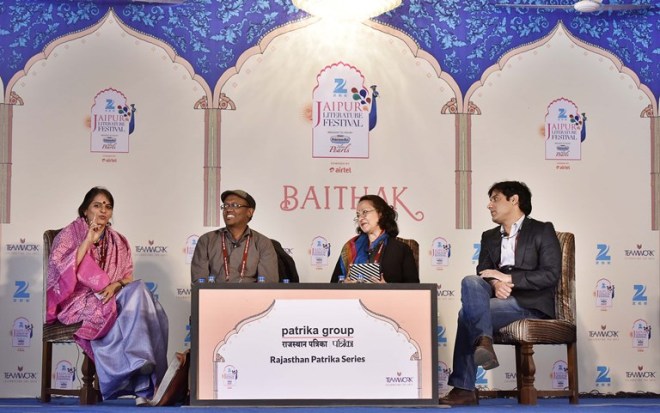Ozy
Sunday April 30, 2017

Abdourahman Waberi (second from left) at the 2016 ZEE Jaipur Literature Festival
Abdourahman Waberi has to be agile, in language and in life. The novelist and poet hails from Djibouti, where, at home with his mother, he spoke Somali. He was schooled in and writes in French, and spends much of his time living in American English while he teaches in Washington, D.C. It makes him “totally schizophrenic,” he confesses.
But Waberi’s writing is far from mad. Rather, it’s calm — almost too calm, leading you to forget that Waberi is often writing with fury, writing what he describes as between an op-ed and poetry. (He does not, he states, follow the rules of the “Maupassant short story,” referring to Guy de Maupassant, the staple of many a seventh-grade English class when students are taught What A Short Story Is.)
Though gentle and shy in person, that changes, Waberi says, when he thinks of his “dysfunctional country. From that point of view … I am an angry man.
And that must come out in a mediated way.” How the anger has emerged in print: In the United States of Africa, which imagines Westerners flocking to a prosperous Africa, ditching the U.S. and Europe, and Passage of Tears, which takes readers to Djibouti, where, as Waberi tells us, “the whole world has arrived.” That arrival is thanks to an unending military presence — first the French came; then, at the onset of the global “war on terror,” the U.S. chose to use Djibouti as its base in the Horn of Africa; and now China and even India are eyeing the nation.
Waberi says he is persona non grata back home. He hasn’t returned to Djibouti since 2007.
Born into a family where “no one was asking about any homework,” Waberi spent his days reading. “I was not the playground kid,” he says. He has a slight limp from an early polio affliction, which, among other health issues, kept him around books more than other boys.
He wrote love letters disguised as “stupid poems” and handed them out en masse to friends, hoping the right person would “get the message” that he was writing just to her. Some of that sentiment remains in his work today — “a work of art is like a gift,” he says. When not engaged in diffident amorous pursuits, Waberi protected himself from being bullied by writing papers for others, an endeavor that helped him understand the power of writing.
In Waberi’s work, you find a certain strangeness — listen for yourself in a moment, as he reads two poems in French and English. The mystical elements may hail in part from the spirits around which he grew up. Even though he was raised in a nonreligious Muslim family, Waberi says he does have some “spiritual inclinations.” Someone says a djinni visited them? “You believe them. ‘OK, yeah, that did happen.’ ”